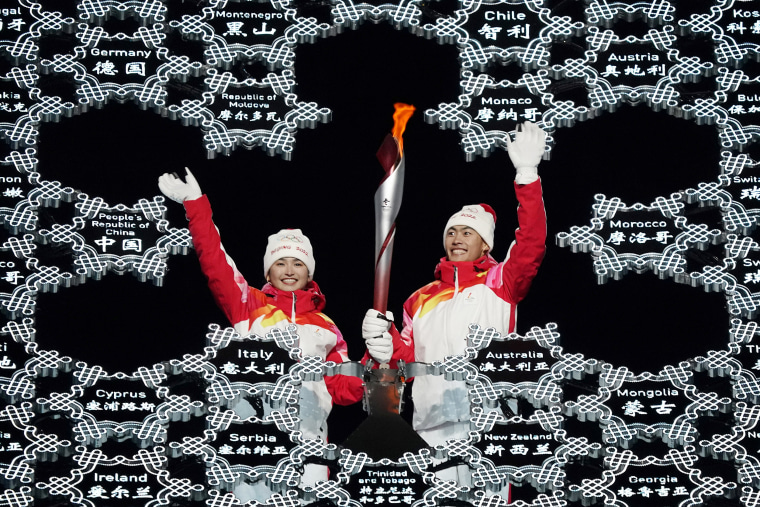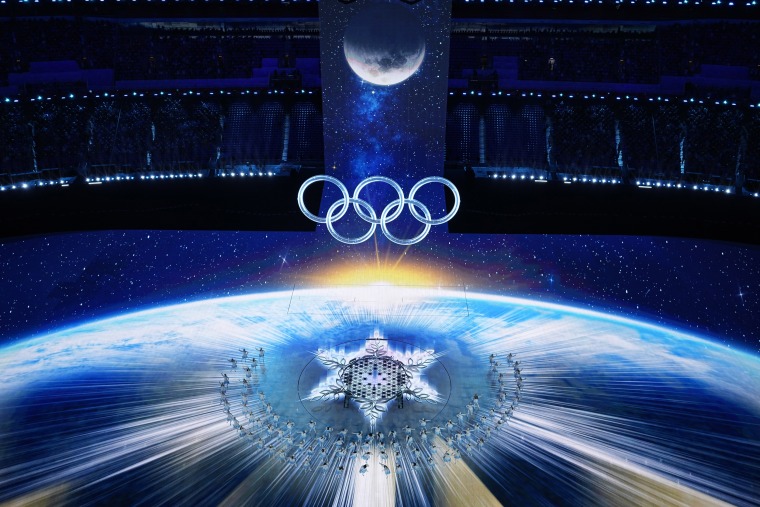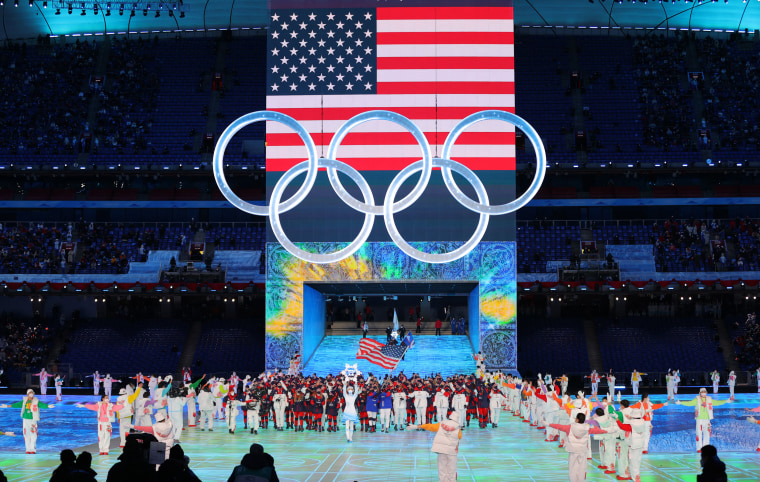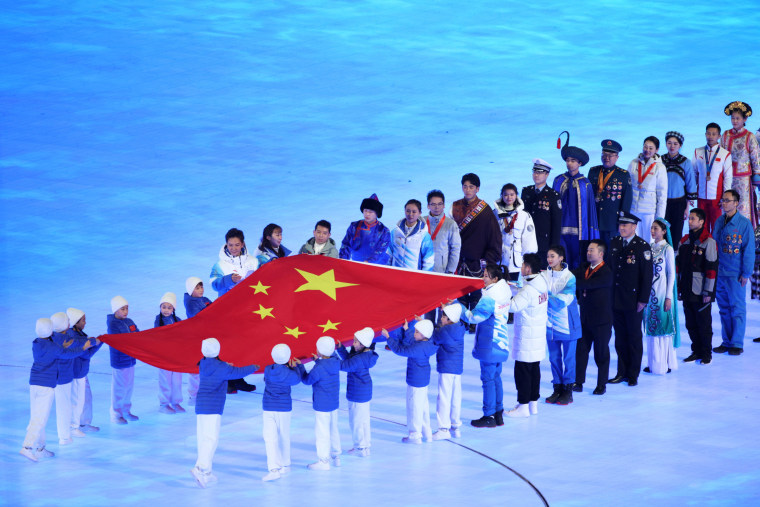China kicked off the 2022 Winter Olympics on Friday with a pared-back but visually stunning opening ceremony and a defiant message to the world leaders boycotting it.
After a brisk, snowflake-themed show that emphasized youth and “ordinary people,” the Games were declared officially open by Chinese President Xi Jinping, prompting a burst of fireworks over the “Bird’s Nest” National Stadium in central Beijing.
The final step was to deliver the ceremonial flame, a moment that often carries symbolic weight based in part on who is selected for the task.
Chinese officials chose two athletes, one of whom was Dinigeer Yilamujiang, a Uyghur cross-country skiier from the western Chinese region of Xinjiang.

The Chinese government’s treatment of the Uyghurs has been described by the U.S. government and others as genocide, contributing to a diplomatic boycott of the Games by the U.S. and other countries.
Beijing has repeatedly denied any mistreatment of the largely Muslim minority and insists its actions in Xinjiang have been taken to combat terrorism.
The pair placed the flame inside a giant snowflake, a closely watched moment with symbolic weight in more ways than one.
“This was a riposte to President Joe Biden for skipping these Olympics and a message to the West: China won’t be lectured to on human rights, or on any other issue,” said Andy Browne, editorial director of the Bloomberg New Economy Forum and a China expert who appeared on NBC’s broadcast of the ceremony.
China is aiming to impress billions around the world with these Games, and perhaps momentarily transcend the fraught geopolitical atmosphere and strict Covid-19 restrictions that have characterized the runup to the competition.
With temperatures appropriately below freezing in the Chinese capital, the ceremony began with an opening sequence focused on youth and spring. The Olympics start on the fourth day of the Lunar New Year, China’s biggest holiday, which is also known as Spring Festival.
Though Xi, Russian President Vladimir Putin and IOC President Thomas Bach were among those watching from the stands, the crowd was limited due to Covid restrictions.
Instead the focus was on a spectacular technology-driven visual show that featured fireworks and a light show before culminating with a block of ice that was “broken” by ice hockey players, giving way to five snow-white Olympic rings.

The Parade of Nations then took place, with athletes wearing masks alongside their winter coats.
The order of appearance was determined by stroke number in the first character of each country’s name in Chinese, with Turkey going second after Greece, which always enters first as the nation where the Olympics began.
Because China is the host country, its 176 athletes went last, entering the stadium to loud cheers and waves from Xi.
The artistic show had a seasonal theme throughout, with snowflakes representing each country coming together to form one giant, 3-D snowflake projected on the floor of the stadium — a high-definition LED screen that is among the largest in the world at almost 125,000 square feet.
Four-time Olympic bobsledder Elana Meyers Taylor and five-time Olympic curler John Shuster were chosen to be the flag bearers for Team USA at the opening ceremony. However, three-time Olympic speed skater Brittany Bowe walked on behalf of Meyers Taylor after she recently tested positive for the coronavirus.
The Winter Olympics are far smaller than the summer edition, with about 90 countries attending the Beijing Games, compared with more than 200 that sent athletes to Tokyo last year. Many countries in Beijing are represented by a single athlete, including Albania, East Timor, Ghana, India, Saudi Arabia and Uzbekistan.
Far larger delegations are representing Winter Olympics powerhouses like the U.S., Germany, Canada and Norway — the country with by far the most medals in the history of the event. Athletes from Russia, another country that dominates winter sports, are once again competing under the banner of their national Olympic committee after a doping scandal.

'The ceremony overall was a scaled-down affair compared with past years, amid drives by both the IOC and the Chinese government to promote sustainability and rein in excess.
Though it began and ended with fireworks, there were only about 10 percent as many as the last time Beijing hosted the Olympics in 2008, according to Reuters. Renowned Chinese filmmaker Zhang Yimou, who directed that ceremony as well as this one, told Chinese state media that the performers in this year’s show would be “ordinary people.”
“The world is turning its eyes to China, and China is ready,” Xi said Thursday ahead of the launch. “We will do our best to deliver to the world a streamlined, safe and splendid Games.”
In stark contrast to the epic 2008 Summer Olympics opening ceremony in Beijing, which ran for about four hours, this year’s pageantry was simplified and shortened to less than 100 minutes because of the pandemic and the cold weather, according to Xinhua, China’s state-run news agency.
Only 3,000 performers, of which teenagers made up the vast majority, took part, compared with 15,000 in 2008, Xinhua said.

The sea of spectators in 2008 was also missing after China barred international fans, and Olympic organizers said they would not be selling tickets to the general public in China.
Along with Biden, the leaders of Australia, Britain and Canada were absent from the opening ceremony. On Thursday, India said the top diplomat at its embassy in Beijing would also not attend after the torch relay featured a Chinese soldier who was injured in a deadly 2020 clash between troops on the Indian-Chinese border.
Putin, the Russian leader, was in Beijing, however, in a show of unity with China amid Moscow’s standoff with the West over Ukraine.
The two leaders met before the opening ceremony on Friday, issuing a joint statement in which they declared their opposition to any expansion of NATO as well as independence in any form for Taiwan, a self-governing island that Beijing claims as its territory.
The Games come at a time when Russia and China have become increasingly confrontational toward the West, and all eyes will be on Russia to see if it chooses to take advantage of the start of the Olympics, and the world’s distraction, to invade Ukraine, as it did in 2008 when it invaded the former Soviet republic of Georgia.
In the weeks leading up to the Games, there were scattered protests around the world against the decision to have Beijing host.